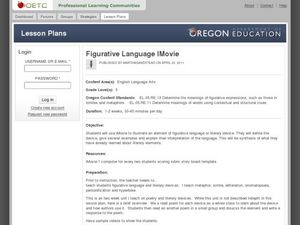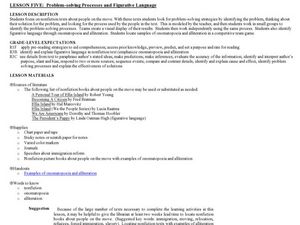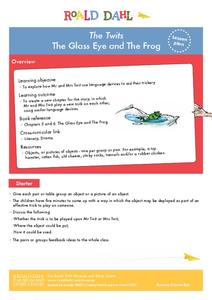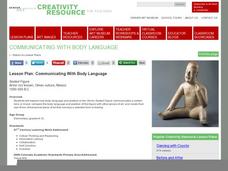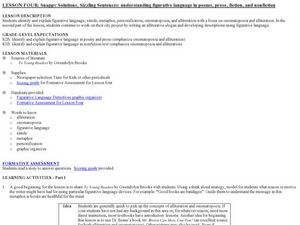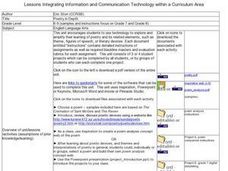Curated OER
Figurative Language iMovie
In order to understand figurative language, learners read 5 poems, each exemplifying a different literary device. They discuss and write responses to each poem. They then choose one literary device which they will use as the basis...
Curated OER
Figurative Language
What is figurative language, and why do we use it? Introduce your high schoolers to some examples and discuss the importance of including this element in your writing. After studying a text and searching for examples, writers will...
Curated OER
Problem-Solving Processes and Figurative Language
Nonfiction texts about people on the move provide young readers with an opportunity to examine not only the problem-solving strategies employed by immigrants, but to also find examples of figurative language these writers use to tell...
Curated OER
It's Raining Cats and Dogs! Literary Devices and Figurative Language
Third and fourth graders study literary devices and figurative language. They view a PowerPoint presentation (which you must create) to review hyperbole, idiom, simile, and metaphor. They read and discuss the book There's A Frog in...
Curated OER
Figurative and literal language through the study of Shakespeare
Sixth graders explore figurative and literal language. They study literary devices through short pieces of Shakespeare's work. Then investigate Shakespeare's works and life.
Roald Dahl
The Twits - The Glass Eye and the Frog
What do a pair of stinky socks and a toy hamster have in common? The third lesson plan in an 11-part unit designed to accompany The Twits by Roald Dahl uses silly objects to teach about figurative language. Zany pranks and role play...
Curated OER
Lesson Plan: Communicating With Body Language
The Olmec were an ancient people native to Mexico who lived from 1000-500 BC. Young artists examine the Olmec piece Seated Figure to analyze the use of body language to communicate a tone or feeling. They then use clay or play-dough...
Curated OER
Snappy Solutions, Sizzling Sentences
An examination of the figurative language in Gwendolyn Brooks’ To Young Readers challenges your writers to think about the richness of language. Ask your class why Brooks says, “Good books are bandages.” This discussion of alliteration,...
Curated OER
Language Arts: Telling a Painting's Story
Use art museum paintings as inspiration for your class's creative writing works. Observing the paintings closely, middle and high schoolers list details and write descriptions. Their completed stories are displayed on bulletin boards...
New Class Museum
Lesson: Emory Douglas: Decoding Images and Vocabulary Activity
To better understand the work of Black Panther logo artist Emory Douglas, learners define literary devices. They define a series of words such as metaphor, simile, and assonance, then place an example of that device found in Emory...
Curated OER
Idioms in Everyday Language
Students describe idioms and their use in everyday language. They describe the difference between literal and idiomatic meanings. In groups, students use iPhoto to create books that explain and illustrate a variety of idioms describing...
Curated OER
Introduction to Symbolism
Your young readers might know that the stars on the American flag symbolize the fifty states, but what symbols best represent who your students are as people? Use this SMART board presentation to guide learners through an activity about...
Curated OER
A Creative Presentation
Bring writing to life with this lesson in which elementary and middle schoolers create a display of the imagery they identify in a series of Gary Paulsen books. They read the suggested materials, identify imagery and descriptive...
Curated OER
Eating Up Idioms
Ah, food idioms! Now that sounds tasty. Class members read and discuss various food-related idioms, create an illustration of a food-related idiom, and develop a class book or bulletin board to celebrate figurative language and National...
Curated OER
Similes
Second graders explore similes. In this figurative language lesson plan, 2nd graders read the book Quick As A Cricket and choose a simile to illustrate.
Curated OER
Reading the Play
Do figures of speech enhance a play or story? In small groups, learners locate and describe figures of speech they find while reading a reader's theater play. After making predictions, they describe how the figures of speech make the...
Curated OER
Creating Civic Awareness Through Artistic and Literary Forms
Interpret current events using editorial cartoons and other print media. Middle schoolers explore the meanings of literary and artistic terms such as satire, irony, and caricature. They visit internet sites to develop an understanding of...
Curated OER
Snowy Similes
The class defines similes after creating a KWL chart about them. Groups rotate through a series of stations in which they creatively complete similes. They create a picture booklet that contains similes. However, the booklet topic and...
Curated OER
Poetry in Depth
Scholars use technology to explore poetry and its related elements, such as theme, figures of speech, and other literary devices. They complete four poetry projects including a poem analysis with a concept web, an interactive poem...
Curated OER
The Language of Surprise
Aspiring writers complete and discuss fill-in-the-blank cliché expressions, define cliché as a form of predictable writing, take cliché expressions and turn them into new, unpredictable ones, read poetry that illustrates writer's use of...
Curated OER
Poetry Writing Unit: Writing a Film Poem
Film poems? To concluded a poetry unit, writers select one of their own poems and create a film that brings to life the sounds and images of their work. Included with the detailed unit plan are daily lessons, student examples, a list of...
Curated OER
What Makes Jokes Funny?
Explore how language is used for comic effect. Middle schoolers determine which of the three formulas for jokes (double meanings, unexpected outcome, humorous mental image) make each of 18 classic, corny examples funny. They complete a...
Curated OER
Let's Go Exploring!
Use a Courbet painting of a cave or tunnel opening to reinforce the importance of descriptive writing. Writers of all ages use sensory details to describe what the scene depicts as they pretend to be in the painting. Then they imagine...
Curated OER
Lesson Plan: Sensory Exploration
Using their keen eyes and ears, learners build story observation skills which they will use to create sensory detail in their art. They note all of the things they observed on a walk, categorize them by sense, and then use the same skill...
Other popular searches
- Figurative Language Poetry
- Figurative Language in Poems
- Figurative Language Quiz
- Figurative Language Project
- Imagery Figurative Language
- Figurative Language Lessons
- Using Figurative Language
- Figurative Language Worksheets
- Figurative Language Test
- Figurative Language in Poetry
- Figurative Language Vocabulary
- Figurative Language in Prose
